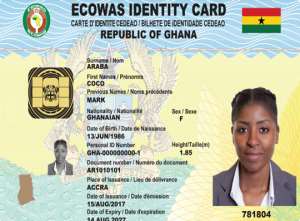
Today the issue of national identity has become a global concern. Making it one of the most discussed topics across the world. Globally, approximately 850 million people are without official identification. These are mainly people in less income countries, marginalised and vulnerable groups with majority found in Sub-Sahara Africa. The government of Ghana’s effort at providing national digital identity for its citizens is a further step at transforming the economy and building a solid relationship among residents. However, whether a digital identity lives up to expectation primarily depends on how it is deigned combined with its security limitations, its effectiveness in terms of functionality and finally how it is handed over to an individual by the government or its representative.
Historically, Ghana’s national identity system could be traced back to 1994 when the National Population Council (NPC) initiated the idea which subsequently made its way into the national population policy. Consequently session 5.10.4 of the document states “appropriate measures shall be taken to ensure that all Ghanaians are registered and issued with identity cards” (National Population Policy Revised Edition, 1994). Thus, laying the foundation for universal identity for all. In 2006 the National Identification Authority (NIA) was established by an act of parliament (Act,707) to provide, maintain and promote a national identity card for social, economic and political purposes.
A national digital identity when linked to population management permits the tracking of demographic characteristics such as birth, age, sex, marital status, place of residence etc, migration patterns, helps in the collecting and monitoring of identity data including issuance of birth certificate, passport and others. Additionally, it provides a unique identifier to every individual within the population eliminating double counting in the delivery of government services like pension and insurance benefits as well as align same across multiple systems.
Evidently digital identities present numerous benefits including accessing governmental and other services at one point in time. Besides fighting cybercrime, providing secured, convenient and faster services including financial transactions, it also reduces cost and distance of doing business through online means. The world bank estimated Uganda saved close to $7 million in a single year by verifying the identities of its civil servants using the national identification database. Similarly, in Malawi $44 million was saved following integration of the voter registration with national identification system. Perhaps similar or related analysis be done for comparability purpose or a clearer understanding of the benefits of such deliberate act. It is the view of the writer such analysis be done to ascertain the gains thereof in the Ghanaian context.
Despite its huge benefits, access to digital national identity is uneven particularly for people without the basic document- birth certificate. It is exciting to hear we still have people without such vital document, even though issuance is entirely free for up to the first 12 months after birth. In the calculation of identity ownership, children aged 15 years and below are excluded however, accessibility is based on gender, income levels as well as rural-urban residency. In the case of Ghana, the problem is compounded by distance to point of service and registration cost.
Government together with other entities in the coming years will use knowledge gained to make critical decisions about the population. For instance, it will be impossible to vote at elections, seek employment or receive medical care without a digital identity. Ghana has a strong governance framework, the NIA to guide government in this regard. Therefore, intensifying publicity using available media channels and in the various local languages on the need to have a digitalized national identity remains an option to be pursued. It is recommended the NIA and partners forge a strong partnership with the NPC which conceptualised the idea of national identity to yield more benefits than imagined. For mere digitization of the system per say do not merit a magic bullet solution of government total control for we might be creating marginalization and vulnerability.
The writer, Frank Ofosu-Asante is a Population Scientist and a Researcher at the National Population Council, Ghana. Email: [email protected]


